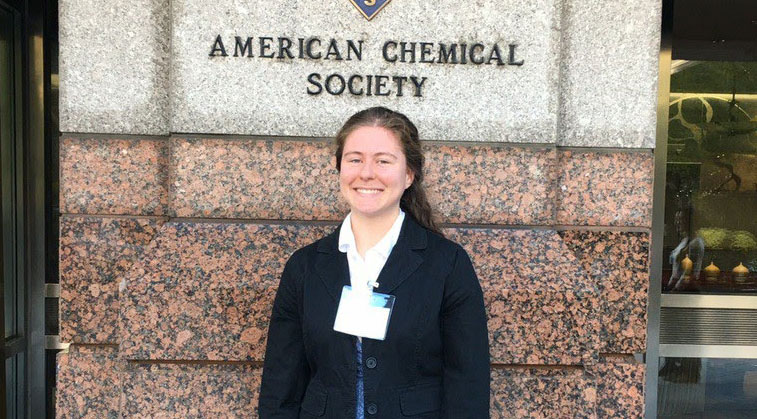Page 47 • (670 results in 0.039 seconds)
-
Rodion A. Zhuravlev, Senior Capstone Seminar Solid polymer electrolytes are a safer alternative to the current electrolytes found in lithium-ion batteries.
- Colorimetric Biosensing Assay using Silver Nanoparticles for Detection of Aptamers and other Biological Targets Katie Cameron, Senior Capstone Seminar The purpose of this research is to recreate a colorimetric detection assay similar to literature and use silver nanoparticles instead of regularly used gold particles to detect DNA and other biological targets. to make this process cheaper/easier to perform. The basic experimental method includes the synthesis of silver nanospheres that are attached to a
-
“There is this moment, where everything around you disappears. Where your vision goes dark, and all you feel is the handle of the oar…” Today is National Girls & Women in Sports Day, so we invite you to put on a life jacket, grab a…
“We are uncatchable” | PLU Women’s Rowing Posted by: Zach Powers / February 1, 2023 February 1
-

This exhibit includes a selection of the library’s print books about women published within the past five years. The books cover a wide variety of issues affecting women’s lives, cultural contexts, political work, artistic achievements, and other issues. The library has an additional 383 e-books…
On Exhibit: Books in Honor of Women’s History Month Posted by: Holly Senn / March 8, 2023 March 8,
-
The Office of Advancement works to raise charitable contributions, which support the mission of Pacific Lutheran University.
prevention and education. Thank you for providing my scholarship. I feel very seen and honored, and it truly reiterates to me what a special place PLU is. I am so glad that I chose to come here, and I appreciate you making that easier for me by relieving some financial stress. Austyn Blair ’25 English Literature major; Holocaust and Genocide Students minor; Religion minor; Gender and Sexuality Studies minor You are dedicated to transformative care. Care motivates us to question paradigms and draw new
Office of Advancement253-535-837712501 Park Ave S Tacoma, WA 98447-0018 -
Fr. Charles R. Gallagher, S.J., of the history department at Boston College will speak about his explorations of a heretofore unknown set of intelligence relationships involving Nazi, British, and
the leading scholars on the Nazi Euthanasia murders. She has been based at the Museum’s Center for Advanced Holocaust Studies (former U.S. Holocaust Research Institute) since 1993. Heberer Rice completed her undergraduate degree in Historical Studies and German Language and Literature at Southern Illinois University as the graduating class’ valedictorian. She conducted her doctoral studies at the Free University of Berlin and the University of Maryland (UMD)-College Park, where Heberer Rice earned
-
Why We Cite In essence, we cite sources because this lets us join and participate in an ongoing scholarly conversation with other scholars.
scholars and researchers in the fields of literature and languages. In-text citations are formatted in a way that allows the reader to easily follow ideas while also providing information about how to locate additional information that might be relevant to them. Citation Generators Citation generators, which can be found in a number of research databases, are tools that let you create a citation in a format of your choice. These tools are relatively accurate, but it’s always important to double check
-

Aminda Cheney-Irgens is a smart, driven, and globally-minded Pacific Lutheran University senior who, like her peers, spent her spring adjusting to a new way of doing college. She’s learned to record Zoom lessons, sharpened her Google Docs skills, and misses the real-life campus interactions. She’s…
being able to read literature, listen to songs, and communicate with others in a different language. Because of schedule complications, I started at PLU as a Hispanic Studies minor. But after studying away in Oaxaca, Mexico, and realizing I was able to fit in the last few courses I needed for the major, I decided to switch over. Welcome to Hispanic StudiesPLU students in the Hispanic Studies Program are challenged to think critically in an increasingly global world and to see the complexity of
-
Biology Courses Take the following two required introductory biology courses: BIOL 225: Molecules, Cells and Organisms BIOL 226: Genes, Evolution, Diversity and Ecology You might also consider some
intended to demonstrate competency in grammar and composition as well as comprehension and analysis of written work. In general, the English requirement is met by taking courses that medical schools would recognize as writing or literature courses. Chemistry Courses Take the following two-course sequence in general chemistry: CHEM 115 (General Chemistry I)* CHEM 116 (General Chemistry II) Take the following two-course sequence in organic chemistry: CHEM 331/333 (Organic Chemistry I + laboratory) CHEM
-
Biology Courses Take the following two required introductory biology courses: BIOL 225: Molecules, Cells and Organisms BIOL 226: Genes, Evolution, Diversity and Ecology You might also consider some
intended to demonstrate competency in grammar and composition as well as comprehension and analysis of written work. In general, the English requirement is met by taking courses that medical schools would recognize as writing or literature courses. Chemistry Courses Take the following two-course sequence in general chemistry: CHEM 115 (General Chemistry I)* CHEM 116 (General Chemistry II) Take the following two-course sequence in organic chemistry: CHEM 331/333 (Organic Chemistry I + laboratory) CHEM
-
Below, you will find a selection of activities and assignments that address some aspect of the research process.
collaborators Brief overview: In many fields, research is conducted in teams or with a collaborator. This activity will help students learn about important voices within a field, as well as identify their own potential “collaborators” from existing scholarship. Instructors, particularly those in introductory courses, will be able to help students understand why certain voices are important in their field, and how to draw on the expertise of others. This activity can be used in lieu of a literature review
Do you have any feedback for us? If so, feel free to use our Feedback Form.


